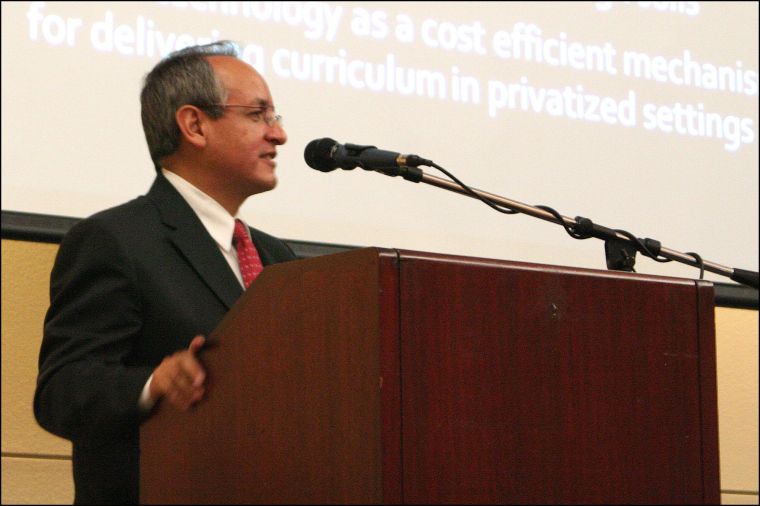“The Challenges of American Higher Education in the Era of Globalization”
Francisco Marmaolejo speaking about global interdependence and how it affects students in the United States.
March 6, 2012
On Thursday, March 1, the Department of Social Sciences presented a guest lecture on “The Challenges of American Higher Education in the Era of Globalization.” The guest speakers Francisco Marmolejo and Dr. Irving Epstein spoke to students and faculty about the issues that the United States faces due to the advent of globalization and what it means for our higher education system and our economy.
Dr. Epstein, Associate Dean of the Faculty and Professor of Education at Illinois Wesleyan University, began the presentation with a brief description of what globalization is and what it is not.
According to Dr. Epstein, “Part of what globalization means involves questioning traditional assumptions as to where one lives, what one’s culture or ethnic identity may be and what one’s political orientation will be.” Epstein explained that in the 21st century people began to take advantage of the increased mobility of our culture and that through this, people were able to create more diversified culture.
Epstein explained that globalization is not, as many people assume, the same as westernization. He spoke about how other cultures have impacted western society as much as western society has impacted them, citing the appearance of sushi in our diets and foreign cars on our roads as evidence of this.
Marmolejo then spoke about the interdependence of the world today. He began by asking students how many of them believed that getting global perspective and experience is important to their education, to which most students raised their hands. He then asked how many believed that they would receive this experience while in college, to which a far fewer number raised their hands. He said that while international experience is vital in a globalized economy, colleges do not provide enough of it for students to truly be prepared to compete with students from other countries.
Marmolejo said, “Students of today realize that something is missing in their higher education, that something is not being provided by their colleges and universities.”
He also told students about the importance of language education, as, according to the study he provided, English is not the most common language in the world and that over the next 50 years it would become even less important.
After Marmolejo’s speech, Epstein spoke again about educational standards in the United States. He began by comparing New York University of New York to New York University’s satellite school in Abu Dhabi, United Arab Emirates. He stated that the standards for these two schools were very different despite being owned by the same University and that this difference in standards cheapens the educational experience.
In order to better our schools, Epstein recommended that we learn from countries that have more successful education systems than our own. In these countries, Epstein stated, teachers are far more respected and better paid, the curriculum is more focused towards success than standardization and that families in these countries promote education and are more actively involved in their children’s education.





